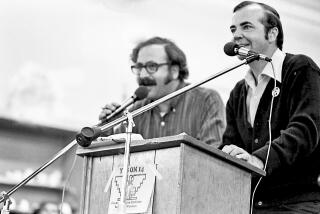Former UMW Chief Arnold Miller Dies : His Term in Office Brought Democracy to Troubled Union
CHARLESTON, W.Va. — Former United Mine Workers of America President Arnold Miller, whose term saw the installation of democracy in a union that had long been under the iron control of its top officers, is dead at the age of 62.
Miller, who presided over court-ordered changes in the internal structure of the UMW, which for years had been the personal domain of such strong leaders as John L. Lewis and W. A. (Tony) Boyle, died early Friday at Charleston Area Medical Center after a long illness, a hospital spokeswoman said.
Miller served as the UMW’s president from 1972 to 1979, a tenure that was sometimes stormy and that included a 110-day nationwide coal strike before a new contract was signed in 1978. The white-haired, red-faced former coal miner resigned as president in 1979 while recuperating from a heart attack and undergoing therapy for a stroke suffered a year earlier.
Wounded in War
Miller grew up in the coal fields east of Charleston, served in World War II and was severely wounded in the Normandy invasion of Europe. He spent 23 months in military hospitals and underwent about 20 operations.
Miller had left school after the ninth grade and took a job in the mines hand-loading coal with his grandfather. His starting wage in 1939 was 77 cents a ton.
“I worked in low coal the more than 20 years I was in the mines,” he said during an interview in 1978. “The last two years of that time, I worked in mud and water and that, really, is what wiped me out. It was always cold and wet down there. I developed spinal arthritis and it got so bad, finally, I couldn’t even sleep at night.”
In addition to arthritis, Miller also suffered from black-lung disease and high blood pressure. These ailments forced him to quit mining in 1969.
Working for Union
It was then that the soft-spoken Miller, who was trying to support his wife and two children on a small disability pension, began to work to improve conditions for coal miners.
His efforts began with attempts to have black-lung disease recognized as a compensable ailment. In three years, he was catapulted from obscurity to the presidency of the 270,000-member UMW, the major union representing coal miners.
Miller was swept into office by a reform movement to bring democracy to the UMW. But before his first five-year term had expired, critics said Miller was becoming authoritarian and said his ninth-grade education left him ill-prepared to run the union.
Changes in the union began in 1969 when an insurgent named Joseph (Jock) Yablonski challenged Boyle for the presidency. Boyle won, but Yablonski planned to challenge the election in court until he, his wife and daughter were murdered in their western Pennsylvania home in December, 1969.
New Elections Called
A federal judge ordered new elections and a new democratic structure for the union. Miller was the candidate of a movement calling itself the Miners for Democracy and defeated Boyle by 15,000 votes.
Boyle, who was later convicted of murder in Yablonski’s death, died last May 31.
Miller’s demands for absolute loyalty--he called dissident union members “scuds”--brought challenges to his leadership and as infighting increased, Miller’s political strength weakened.
Midway through his first term, Miller fell out with the officers who had shared his election ticket and began alienating staff members. During this period, waves of wildcat strikes began to roll over the Appalachian coal fields.
Miller was reelected in 1977 with a different slate of officers, including Sam Church Jr. as vice president. Miller soon began suffering from physical problems, however, and stepped down in November, 1979, turning the job over to Church. Miller had suffered a stroke and heart attack in 1978, after the long strike by the union, which had rejected two of his attempts to get a contract. Church in turn lost his first election bid in 1982 to current President Richard Trumka.
Miller spent his last years troubled by ill health. He made a run for the presidency again in 1982 but could not get enough support to win a spot on the ballot.
More to Read
Sign up for Essential California
The most important California stories and recommendations in your inbox every morning.
You may occasionally receive promotional content from the Los Angeles Times.










